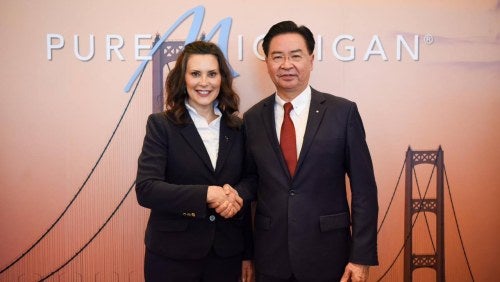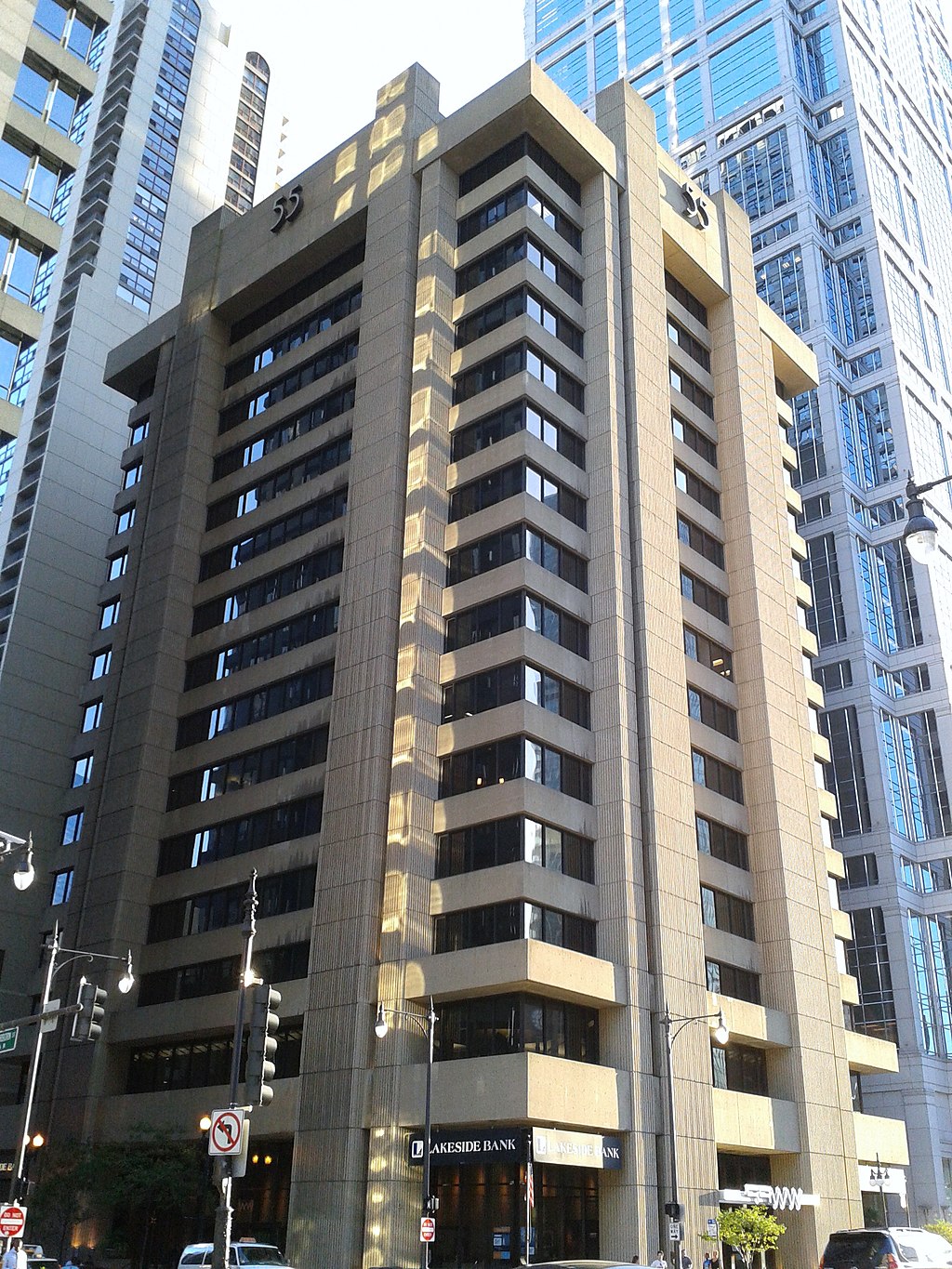How Midwestern states are courting Taiwanese investment

Despite Illinois's trade ties with Taiwan, other Midwest states have taken steps that Illinois hasn’t to deepen their government’s relationship with Taipei.
The Midwest lies thousands of miles from the Taiwan Strait, but it’s still buffeted by turbulent cross-strait relations.
Illinois and its neighbors have always had to weigh the concerns of both Taiwan and mainland China when courting foreign direct investment from either party. In the past, that sometimes made states reluctant to partner with Taiwan, since the People’s Republic of China — Illinois’ second-largest trade partner — considers the island a renegade province.
As Taiwan’s industrial and economic influence has grown — particularly in high-tech sectors — that hesitancy has waned. But, with political tension and military activity between Taiwan and the mainland by some measures fiercer than ever, different states have taken different approaches to getting Taiwanese investors to choose them for their next Midwestern project.
Illinois has a strong economic relationship with Taiwan. The island is one of the state’s largest import sources and a critical trade partner, especially for tech products like semiconductors, for which Taiwan is home to the world’s largest manufacturer. In 2022, Taiwan exported $1.9 billion in computer and electronics equipment to Illinois.
Despite those deep trade ties, some other Midwest states have taken steps that Illinois hasn’t to deepen their governments’ relationships.
Michigan and Indiana’s governors have both visited Taiwan (Michigan’s Gov. Gretchen Whitmer has been twice). Both Michigan and Indiana have signed memorandums of understanding (MOUs) between Taiwan and official state offices, agreeing to cooperate on semiconductors specifically. While several Illinois universities have signed MOUs with Taiwanese institutions, there isn’t a comparable state-level MOU between Illinois and Taiwan.
In March, Michigan went even further and opened the state’s first Michigan Taiwan Office in Taipei, to “focus on investment promotion and building ties between Michigan and Taiwan,” especially in the chip and electric vehicle industries.
Illinois-Taiwan trade ties
The Illinois Department of Commerce and Economic Opportunity (which did not respond to a request for comment) maintains six overseas offices, including an Asia-Pacific regional office in Japan and a Chinese trade office in Shanghai, but does not operate a Taiwan-specific office.

55 W. Wacker Dr., the home of the Taipei Economic and Cultural Office in Chicago. Credit: Matthew Bisanz
At the local level, though, Chicago is home to the Taipei Economic and Cultural Office (TECO), which acts as Taiwan’s official diplomatic mission for seven Midwestern states, including Illinois.
“Illinois’ investment environment is very good: you have the engineering, the resources,” TECO’s Director-General Dennis Lei told ChicagoGlobal. “Illinois is always our top priority because we are stationed here,” he added.
Illinois’ trade with Taiwan has grown substantially in recent years. From 2009 to 2022, Illinois exports to Taiwan increased by 7% to $880 million, with a 107% increase in chemical exports. Agricultural exports fell 24%, but Taiwan — which relies on imported food — did announce purchases of Illinois corn and soybeans in 2019 and 2022 that totaled more than $4 billion.
In the same 13-year period, Illinois imports from Taiwan exploded, rocketing up more than 200% to $4.4 billion.
But Lei suggested that Taiwanese companies might be contrasting Illinois’ Taiwan ties with Michigan’s multiple governor’s visits, MOU, and new Taipei office.
For example, he notes that Taiwanese electric bus company Master Transportation came to Chicago for a site visit, with an eye toward future investment. “But since we don’t have this kind of arrangement,” he said, “that may be delayed a little.”
There’s a formula for courting more Taiwanese investment, in Lei’s view. “Office, memorandum, and governor visit is always the key,” he said.
Balancing Taiwan and China
“Michigan’s government used to keep [a] long distance with our government,” Lei said.
In his observations, officials in state and local governments seemed hesitant until recently to engage with Taiwan because they worried that it would make it more difficult to maintain economic ties with China, or that investing in Taiwan was too risky because China could use military force for “reunification.”
“But once they [Michigan] made a decision, they still kept doing business with China — but [also] attract[ed] more and more business from Taiwan,” Lei said.
Quentin Messer, CEO of the Michigan Economic Development Corporation, agreed, saying that a trade-off between closer ties with Taiwan and investment from mainland China “hasn’t been our lived experience.”
"We are not naive to what is happening — the geopolitical world or atmosphere in which we operate."
“We are trying to move beyond an ‘or’ mindset in Michigan. You can engage with Taiwan as appropriately prescribed by federal statute and — modeling at the federal level — with mainland China,” he said.
As head of Michigan’s economic development office, Messer said he looks to align the state’s policy with federal policy — describing it as his team’s North Star.
Lei has seen this same dynamic play out across the region. He has found that state and local governments sometimes wait for federal encouragement to sign agreements with Taiwan, and that, when new federal guidelines do pass, local officials still occasionally take months or years to get “the real feel” of the policy before proceeding.
The federal government’s bipartisan CHIPS and Science Act, though, may be accelerating the process. After COVID snarled global supply chains for semiconductors, the legislation authorized $280 billion to encourage domestic semiconductor manufacturing, R&D, and workforce development.
With billions of CHIPS Act dollars up for grabs, Messer explains, state economic development offices are incentivized to align their policy priorities with federal industrial policy to compete with each other.
Competing with Illinois is hard, Messer said, praising Intersect Illinois, which heads up Illinois’ global business development, and its CEO, Dan Seals.
“He’s a tough competitor,” said Messer. “We’re all pushing each other, and so I think it’s a good thing for the industrial heartland.”
Chicago moving closer to Taiwan
In 2022, the Chicago City Council established a Taiwan Friendship Caucus in collaboration with TECO to “further the bilateral relationship” and strengthen ties between the city and Taiwan.
The caucus’s founding came just weeks after Illinois Senator Tammy Duckworth led a delegation to Taiwan, something she has done a number of times (including most recently on a visit late last month). Then-Speaker Nancy Pelosi also traveled to Taiwan in 2022 — the highest-ranking U.S. official to do so since Newt Gingrich in 1997.
Trips like these from federal officials have “changed a lot” in Chicago’s municipal government, according to Lei.
“In the past, [in] the City of Chicago, our access is very limited,” he said. Before these federal delegations gained traction, Lei believes that establishing a Taiwan Friendship Caucus would have been difficult because lawmakers would have worried about China’s opposition.
“But now, no one cares,” he said.
Outside of city hall, local universities have also introduced or expanded Taiwanese partnerships. Several of Chicago’s largest schools, including Northwestern and the University of Chicago, have signed MOUs and established exchange programs with National Taiwan University (NTU).
Chicago’s tech research campus — the Discovery Partners Institute — also partners with National Taiwan University, and the University of Illinois System and NTU jointly fund research teams in semiconductors and quantum technology — a priority for the Pritzker administration.
Taken together, in Chicago, political, economic, and cultural ties to the island are deepening, even if Springfield’s relations with Taiwan don’t yet match those of some Midwestern neighbors.
This story first appeared in the ChicagoGlobal newsletter, a joint project of Crain's Chicago Business and the Chicago Council on Global Affairs.

